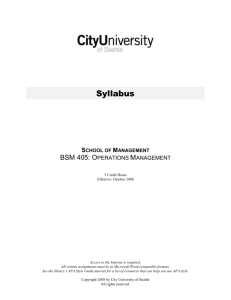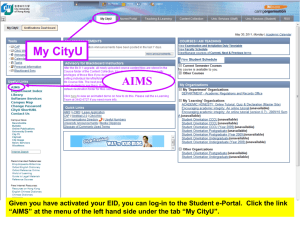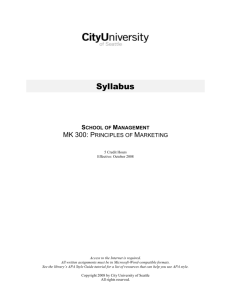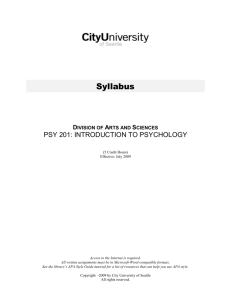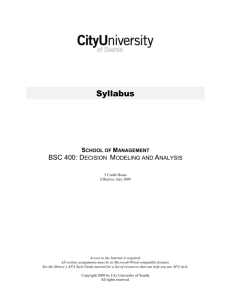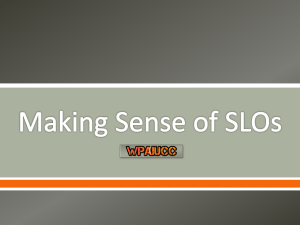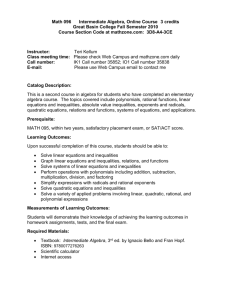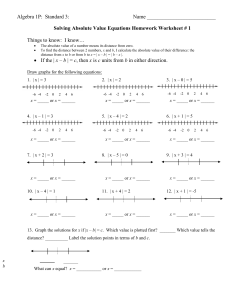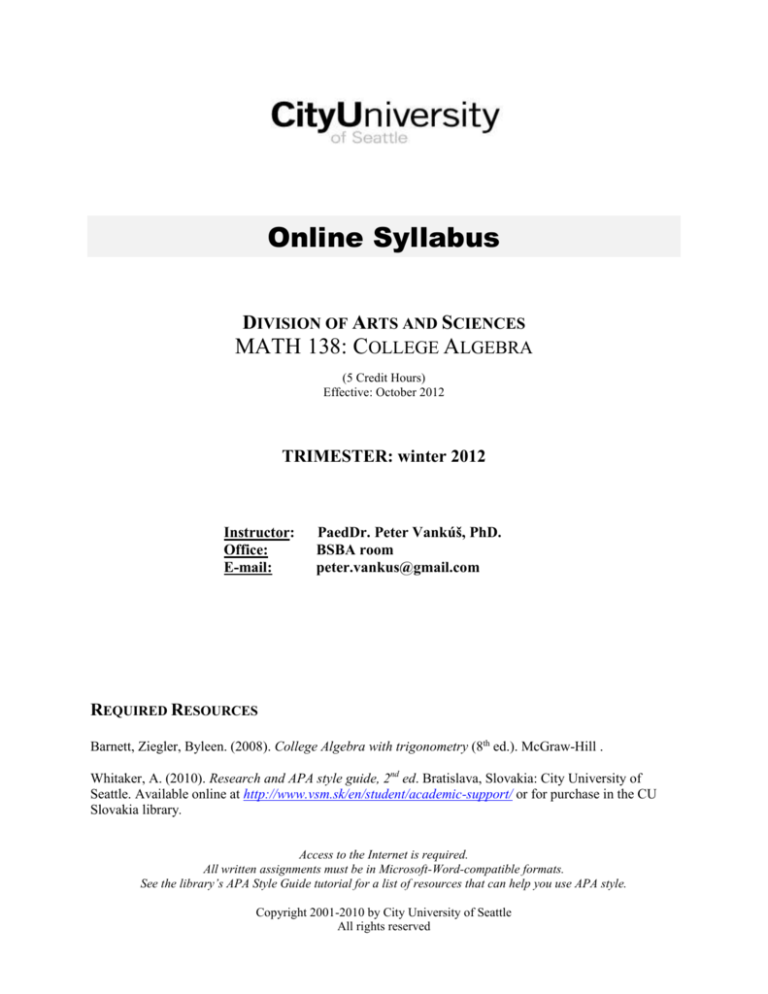
Online Syllabus
DIVISION OF ARTS AND SCIENCES
MATH 138: COLLEGE ALGEBRA
(5 Credit Hours)
Effective: October 2012
TRIMESTER: winter 2012
Instructor:
Office:
E-mail:
PaedDr. Peter Vankúš, PhD.
BSBA room
peter.vankus@gmail.com
REQUIRED RESOURCES
Barnett, Ziegler, Byleen. (2008). College Algebra with trigonometry (8th ed.). McGraw-Hill .
Whitaker, A. (2010). Research and APA style guide, 2nd ed. Bratislava, Slovakia: City University of
Seattle. Available online at http://www.vsm.sk/en/student/academic-support/ or for purchase in the CU
Slovakia library.
Access to the Internet is required.
All written assignments must be in Microsoft-Word-compatible formats.
See the library’s APA Style Guide tutorial for a list of resources that can help you use APA style.
Copyright 2001-2010 by City University of Seattle
All rights reserved
MATH 138
COLLEGE ALGEBRA
COURSE DESCRIPTION
MATH138 is an examination of definitions and concepts of College Algebra including a review of
fundamental algebra concepts. Topics also include graphing, linear and quadratic equations, linear
inequalities, and linear programming. Every concept includes practical everyday applications, which
focus on reducing math anxiety. This course satisfies the general math requirement and is essential as
preparation for mathematics, statistics, and accounting courses.
COURSE RESOURCES
Required and recommended resources to complete coursework and assignments are listed on the
My.CityU portal at Library>Resources by Course.
CITYU LEARNING GOALS
This course supports the following City University learning goals:
City University of Seattle graduates exhibit professional competency and a sense of professional
identity.
City University of Seattle graduates are critical thinkers.
City University of Seattle graduates are lifelong learners.
PROGRAM CONTEXT
This course fulfills college algebra requirement for your degree.
COURSE OUTCOMES
Upon the successful completion of this course, you will be able to:
1. Identify algebraic properties and rules;
2. Solve linear and quadratic equations for unknowns;
3. Graph linear and quadratic equations;
4. Evaluate polynomial functions;
5. Evaluate exponents and radicals;
6. Solve linear systems of inequalities with two variables;
7. Solve linear programming problems.
CORE CONCEPTS, KNOWLEDGE, AND SKILLS
To achieve the goals of this course, you will need to master the following core concepts:
1. Real numbers;
2. Exponents;
3. Radicals;
4. Polynomials;
5. Rational expressions and variations;
6. Coordinate system and graphing;
7. Linear equations and inequalities;
8. Quadratic equations;
9. Systems of equations and inequalities;
10. Linear programming.
MTH138
Page 2
Eff: October 2012
RECOMMENDED SUPPLEMENTARY RESOURCES
As a City University of Seattle student, you have access to library resources regardless of where and
how you are taking this class. To access the resources that are necessary to complete your coursework and
assignments, visit the library menu in the My.CityU portal at http://my.cityu.edu.
A good place to begin your research is through the program or course resource sections that provide links
to relevant journals, books, and Web sites. Search the library's online catalog to locate books and videos,
and place requests to have items mailed to you (services vary by location). Search the online databases
for journal, magazine, and newspaper articles. Articles that are not available full text in the library's
collection can be requested from other libraries and delivered to you electronically.
For additional help, submit your question via the Ask a Librarian e-mail service available through
the portal or call 800.526.4269 (U.S. or Canada) or 425.709.3444.
PRINT RESOURCES
Amdahl, K., & Loats, J. (1995). Algebra unplugged. Broomfield, CO: Clearwater.
Blitzer, R. (2004). Student solution manual for college algebra. (3rd ed.). Upper Saddle River, NJ:
Prentice Hall.
Clawson, C. C. (1991). Conquering math phobia: A painless primer. New York: Wiley.
Hult, C. A., & Huckin, T. N. (2004). The brief new century handbook (2nd ed.). Boston: Allyn &
Bacon/Longman.
Kitchens, A. N. (1995). Defeating math anxiety. Chicago: Irwin.
Orr, B. (1992). Harpercollins college outline: College algebra. New York: HarperCollins.
Smith, R. M. (1998). Mastering mathematics: How to be a great math student. (3rd ed.) Pacific Grove,
CA: Brooks Cole.
Tobias, S. (1995). Overcoming math anxiety. New York: Norton.
ELECTRONIC RESOURCES
The following Internet resources may be of use to you in this course. Please be aware that Web addresses
may change from time to time. Consult your instructor if you have questions about electronic resources.
A Catalogue of Mathematics Resources on WWW and the Internet
http://mthwww.uwc.edu/wwwmahes/files/math01.htm
City University of Seattle
http://my.cityu.edu
OVERVIEW OF COURSE GRADING
The grade you receive for the course will be derived using City University of Seattle/Vysoká škola
manažmentu’s decimal grading system, based on the following:
Assignments
Percentage of Final Grade
Active Participation
Quizzes and Homework Assignment
Midterm Exam
Final Exam
20%
30%
25%
25%
TOTAL
100%
MTH138
Page 3
Eff: October 2012
SPECIFICS OF COURSE ASSIGNMENTS
Active Participation
Class participation expands your knowledge and ability to implement strategies learned in the course.
Thus, you are expected to participate fully in each class. This includes preparing for each class session
(reading and/or homework), demonstrating familiarity with the reading assignments, asking questions
from previous class material, contributing new ideas, and/or challenging points from the reading or
lecture. Most importantly, the course will have a variety of in-class activities, such as class discussions,
small-group work, case studies, exercises, peer feedback, and/or simulations, and you are expected to play
an active and constructive role in each.
Students in this course are also expected to demonstrate a commitment to professionalism, in part through
regular attendance and participation, but also through the following: prompt arrival to class, respect to
fellow students, a positive attitude, and following VŠM policies on appropriate classroom behavior and
no cell phone use.
You cannot earn participation points or receive credit for in-class activities when you are
absent. Participation points cannot be made up.
Grading Criteria for Active Participation
Contributions to class activities (relevance, depth, quantity)
Demonstration of timely preparation and familiarity with
course concepts
Demonstrated respect to instructor and fellow students
TOTAL
50%
30%
20%
100%
Quizzes and Homework Assignments
You will have quizzes in the course to reinforce the course materials. The quizzes will test your ability to
utilize mathematical terminology as well as the identification and application of proper mathematical
tools for a given problem. All quizzes will be based on homework assignments. You may also use a
calculator during the testing period.
Grading Criteria for Quizzess
Clear demonstration of ability to employ concepts, methods,
and techniques
Logical and sequential development of results
Successful problem completion
TOTAL
20%
30%
50%
100%
Exams
You should be prepared to answer a variety of types of questions pertinent to the concepts covered in or
suggested by the course materials. Types of questions include true/false, multiple choice, short answer
questions, and graphical or mathematical problems. Show all your calculations because even if you have
MTH138
Page 4
Eff: October 2012
the wrong final answer, you can earn partial credit for using the appropriate methods. If a calculator is
necessary during the examinations, you must have your own calculator. Mobile phones may not be used
as calculators.
The midterm exam will cover the first five weeks of the course. The final exam will cover the entire term.
Your instructor will provide additional information about the content and style of examinations in this
course.
Grading Criteria for Problems on Examinations
Clear demonstration of ability to employ concepts, methods,
and techniques
Logical and sequential development of results
Appropriate depth of analysis
Appropriate organization and format
Successful problem completion
TOTAL
20%
30%
20%
10%
20%
100%
MTH138
Page 5
Eff: October 2012
COURSE POLICIES
Late Assignments
Per Division of Arts and Sciences policy, undergraduate students are required to submit all assignments
by the due dates stated in the syllabus. A late assignment is one that is submitted after the due date and
time or after any extension has expired.
If circumstances prevent a student from meeting the due date, the student is obliged to contact the
instructor and request an extension at least 48 hours prior to the date the assignment is due. Emergency
situations will be considered on a case-by-case basis. Being busy, pressured with outside work, or having
competing academic commitments are not valid reasons to grant extensions.
A student who receives an extension in advance of the due date and abides by the agreement with the
instructor is not subject to late penalties.
Without prior arrangement with the instructor, students who submit assignments late will receive a 15
percent deduction in grade each day or part of the day that the assignment is late. For example, if the
assignment is submitted two days late, 30 percent of the grade will be deducted.
Coursework received after one week (seven days) will not be graded and will receive a zero grade.
Professional Writing
Assignments require error-free writing that uses standard English conventions and logical flow of
organization to address topics clearly, completely, and concisely. CityU requires the use of APA style.
UNIVERSITY POLICIES
You are responsible for understanding and adhering to all of City University of Seattle’s academic
policies. The most current versions of these policies can be found in the University Catalog that is linked
from the CityU Web site.
Scholastic Honesty
City University of Seattle expects each student to do his/her own work. The University has "zero
tolerance" for cheating, plagiarism, unauthorized collaboration on assignments and papers, using "notes"
during exams, submitting someone else's work as one's own, submitting work previously submitted for
another course, or facilitating acts of academic dishonesty by others. Scholastic Honesty policy applies
also to online discussions that represent a part of assignments in online courses. Every reference material
used in discussion contributions must be cited according to the current Research & APA Style Guide. The
penalties are severe! A first offense results in a zero grade for the course; a second offense can result in a
zero grade for the course and suspension for one or more quarters; a third offense can result in expulsion
from the University. The Policy and Procedures may be found at
http://www.vsm.sk/en/students/scholastic-honesty/policies-and-procedures/.
In addition to providing your work to the instructor for grading, you must also submit an electronic copy
for the City University of Seattle archives (unless the work is specifically exempted by the instructor).
You will not receive a grade for particular work until and unless you submit this electronic copy. The
MTH138
Page 6
Eff: October 2012
procedure for submitting work to the archives is to upload it via the website
http://www.vsm.sk/en/students/on-line-center/uploader/uploader.html . Files should include the cover
page of the work with the student name, instructor name, course name and number, and date. File names
should indicate the type of assignment, such as “researchpaper.doc”, “casestudy.doc” or “ thesis.doc”
(student name should not be a part of the file name because the system adds it). All files received into the
archives are submitted to www.TurnItIn.com for plagiarism checking.
Attendance
Students taking courses in any format at the University are expected to be diligent in their studies and to
attend class regularly.
Regular class attendance is important in achieving learning outcomes in the course and may be a valid
consideration in determining the final grade. For online classes, a student has attended if s/he has posted
or submitted an assignment. A complete copy of this policy can be found in the University Catalog in the
section titled Attendance Policy for Mixed Mode, Online and Correspondence Courses.
SUPPORT SERVICES
Disability Resources
If you are a student with a disability and you require an accommodation, please contact the Disability
Resource Office or your associate dean as soon as possible. For additional information, please see the
section in the University Catalog titled Students with Special Needs under Student Rights &
Responsibilities.
Library Services
In order to help you succeed in this course, you have access to library services and resources 24 hours a
day, seven days a week. CityU librarians can help you formulate search strategies and locate materials
that are relevant to your coursework. For help, contact a CityU librarian through the Ask a Librarian
service. To find library resources, click on the Library link in the My.CityU portal.
The Slovakia library homepage is at http://library/cutn.sk/. For additional help, visit the Slovakia library
or submit your question in the Contact Us section of the Slovakia library’s web site.
Smarthinking
As a CityU student, you have access to 10 free hours of online tutoring offered through Smarthinking,
including writing support, from certified tutors 24 hours a day, seven days a week. Contact CityU’s
Student Support Center at info@cityu.edu to request your user name and password.
MTH138
Page 7
Eff: October 2012
COURSE SCHEDULE
SESSION
TOPICS AND ASSIGNMENTS
READINGS
1
Review of Fundamental Concepts of Algebra;
Algebra and Real Numbers
Exponents
Ch. R.1-R.2
Ch. R.3-R.4
2
Review of Fundamental Concepts of Algebra continued;
Radicals
Polynomials: Basic operations
Homework test 1
Ch. R.5-R.6
3
Review of Fundamental Concepts of Algebra continued;
Factoring Polynomials
Rational Expressions: Basic Operations
Linear Equations and Their Applications
Systems of Linear Equations in Two Variables
Solving a System by Graphing
Homework test 2
Ch. 1.1-1.2, 10.1
4
Quadratic Equations and Applications
Review session
MIDTERM EXAM
Ch. 1.5
5
6
Distance in the Plane
Equation of a line
Linear Equations and models
Ch. 2
Linear Inequalities
Systems of Linear Inequalities in Two Variables
Quadratic Inequalities
Homework test 3
Ch. 1.2, 10.7
8
Linear Programming
Project assignment
Ch. 10.8
9
Permutations and Combinations
Homework test 4
Ch. 11.4
7
10
Review session
FINAL EXAM
MTH138
Page 8
Eff: October 2012

